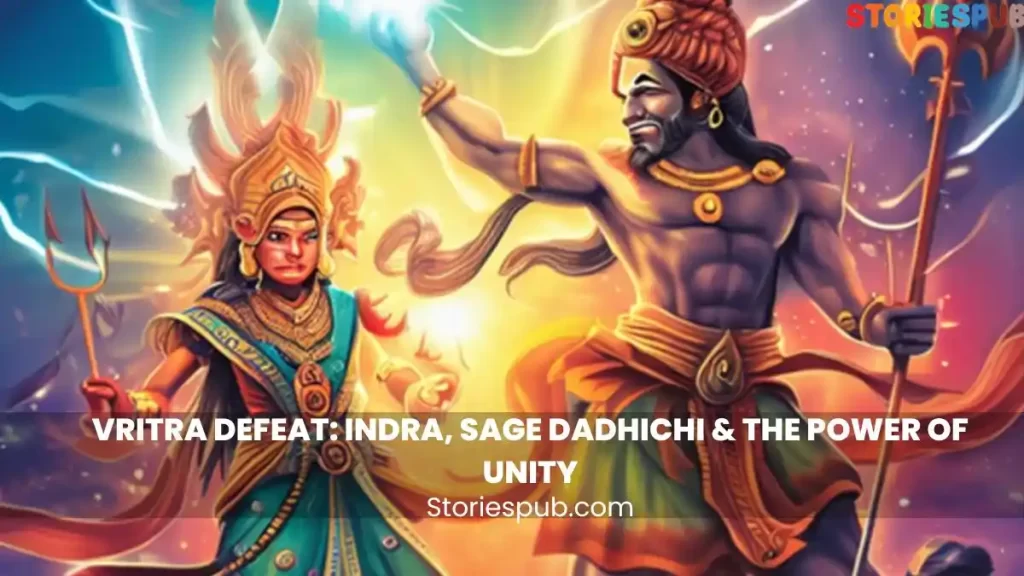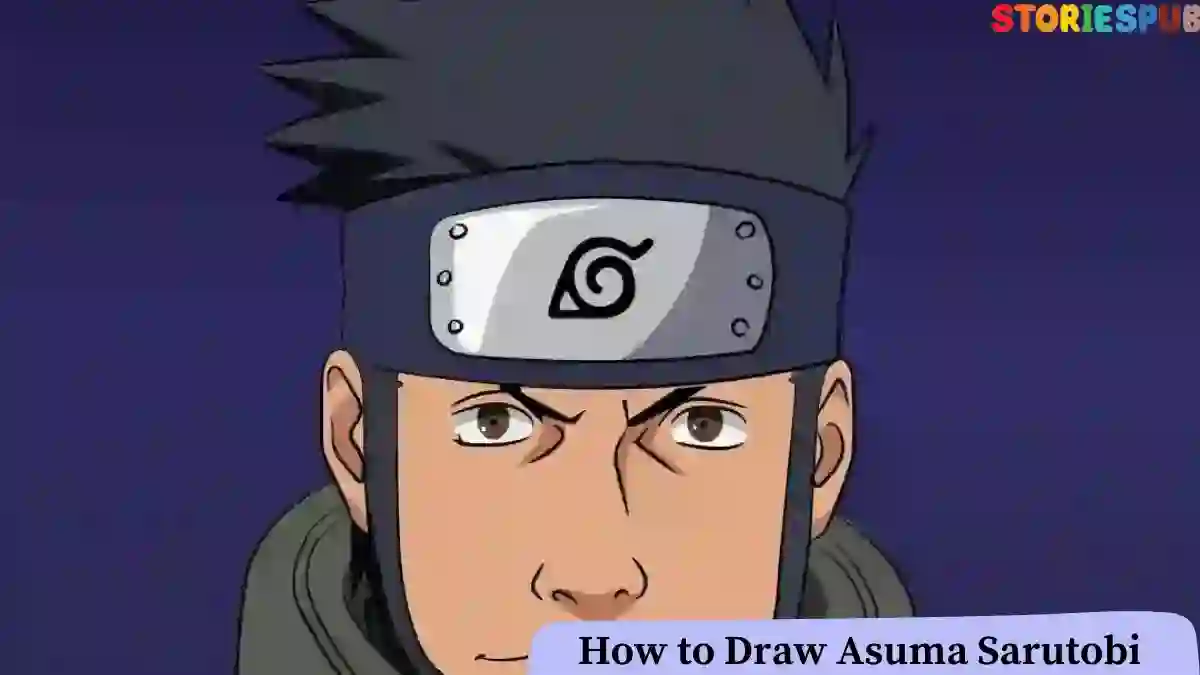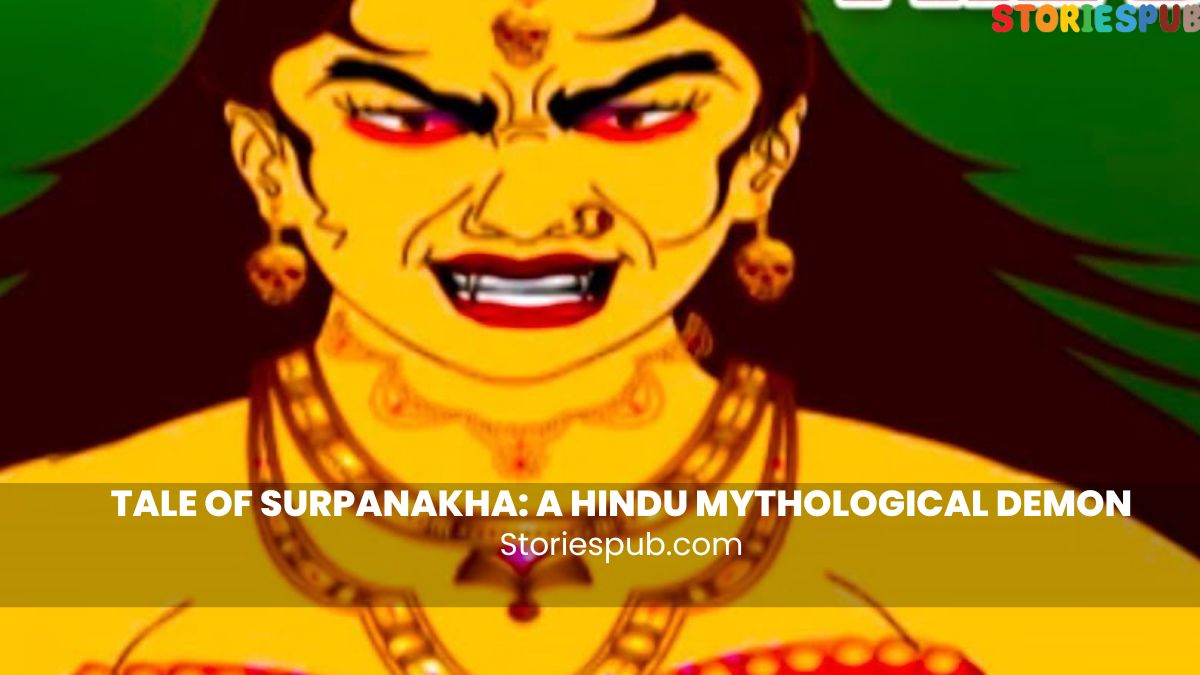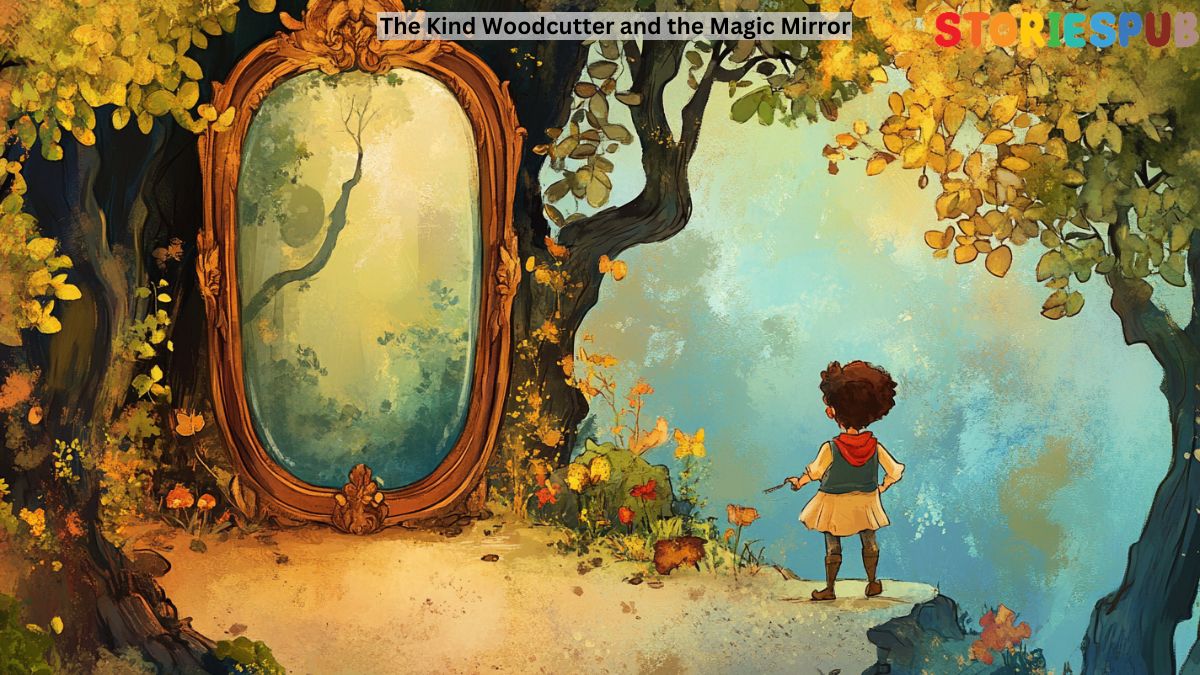Summarize this Article with:
Vritra Defeat: Indra, Sage Dadhichi & the Power of Unity

Hindu mythology has a rich tapestry of stories, characters, and teachings that have shaped the beliefs, values, and culture of Hinduism throughout history. These mythological tales often serve as allegories, conveying spiritual and moral lessons that resonate with people across generations. One such captivating story is that of the demon Vritra, who caused immense suffering to both gods and humans, and was ultimately defeated by Lord Indra with the help of Sage Dadhichi’s bones. This tale is a powerful reminder of the triumph of good over evil, as well as the importance of self-sacrifice, courage, and adherence to dharma (righteousness).
Origin and Characteristics of Demon Vritra
The demon Vritra has a complex and intriguing origin story that can be traced back to the earliest Hindu texts, primarily the Rigveda, one of the oldest sacred scriptures in the Hindu tradition. The myth of Vritra provides a rich narrative that explores themes of conflict, dharma (righteousness), and the triumph of good over evil, shedding light on the ongoing struggle to maintain balance in the universe.
Origin of Vritra:
Vritra was born out of the fury and resentment of the sage Twashta, who sought vengeance against the gods for the death of his son Trisiras, a powerful and wise being with three heads. Devastated by his son’s death at the hands of Lord Indra, the king of the gods, Twashta performed a powerful yajna (sacrificial ritual) with the intent of creating an invincible demon that could challenge and defeat Indra. As the ritual reached its culmination, the demon Vritra emerged from the sacrificial fire, embodying the wrath and desire for revenge that had fueled Twashta’s ritual.
Physical Characteristics:
Vritra is often depicted as a colossal serpent or dragon, with a terrifying appearance that reflects his destructive nature. His gigantic body is covered with thick, impenetrable scales, and his eyes burn with a malevolent fire. Vritra’s massive size allows him to encircle and constrict the rivers of the world, withholding the life-giving waters from both gods and humans. His formidable appearance, combined with his immense strength and supernatural powers, make him a deadly enemy capable of challenging even the mightiest of gods.
Powers and Abilities:
As a being born of revenge and fury, Vritra possesses several supernatural abilities that contribute to his status as a formidable adversary. His most prominent power is his ability to control and block the flow of rivers, causing droughts and famines that impact the lives of humans and gods alike. In addition to his water-controlling powers, Vritra is virtually invulnerable, with his thick scales and magical defenses rendering him nearly impervious to harm. This invincibility, coupled with his great strength and aggressive nature, make Vritra a relentless and deadly force of destruction.
Symbolism of Vritra:
In Hindu mythology, Vritra represents the forces of chaos and darkness that continually threaten to disrupt the balance and harmony of the universe. The struggle against Vritra symbolizes the ongoing battle between light and darkness, order and chaos, and the efforts of both gods and humans to uphold the principles of dharma and ensure the triumph of good over evil. The tale of Vritra serves as a reminder of the importance of courage, self-sacrifice, and unwavering dedication to righteousness in the face of adversity.
How Vritra Caused Trouble for Gods and Humanity
Vritra, the formidable demon born out of sage Twashta’s desire for revenge, brought immense suffering and devastation upon the gods and humanity alike. His primary means of torment involved using his immense powers to disrupt the natural order and wreak havoc upon the world.
Control Over Waters:
Vritra’s most devastating act was his control over the world’s rivers and water sources. As a massive serpent or dragon, he would encircle and constrict the rivers, preventing them from flowing freely. This resulted in severe droughts, as the life-sustaining waters were no longer available to nourish the earth and its inhabitants. Without water, crops withered and died, leading to widespread famine among humans and animals.
Impact on Gods:
The gods, too, were affected by Vritra’s actions. As the demon constricted the rivers, he withheld the sacred waters that the gods relied on for their sustenance and power. The gods were weakened by this deprivation, rendering them vulnerable to attack by Vritra and other malevolent forces. With their powers diminished, the gods struggled to maintain order in the universe and protect humanity from the escalating chaos brought on by Vritra’s actions.
Challenging the Divine Order:
Vritra’s very existence was a challenge to the divine order, as he was created with the express purpose of defeating Indra and exacting revenge on the gods for Trisiras’ death. By bringing destruction and disorder to the world, Vritra sought to undermine the authority of the gods and usurp their control over the cosmos. The demon’s actions sowed discord among the gods, forcing them to confront the powerful and seemingly invulnerable force that threatened their very existence.
Effects of Vritra’s Actions on the World:
The impact of Vritra’s actions was felt far and wide, causing extensive suffering and devastation throughout the world. The droughts and famines that resulted from Vritra’s control over the waters had disastrous consequences for humans, animals, and the environment. Without water, the land became parched and barren, leading to the collapse of ecosystems and the loss of countless lives.
Society also suffered from the dire effects of Vritra’s actions, as the scarcity of resources led to increased conflict and strife among humans. Desperation and fear caused people to turn against one another, as they struggled to survive in the harsh conditions brought on by the demon’s reign of terror.
The turmoil caused by Vritra extended to the spiritual realm as well. As people suffered and lost faith in the gods’ ability to protect them, the cosmic balance was further disrupted. The gods were compelled to seek a means to restore the balance and defeat Vritra, ultimately leading to the dramatic confrontation between the demon and Lord Indra.
Why Indra was Chosen to Defeat Vritra
Lord Indra, the king of the gods, was chosen to defeat Vritra due to several factors that made him the most suitable candidate for this daunting task. As the leader of the Devas (gods), Indra held a significant position in Hindu mythology, and his victory over Vritra would serve to uphold the divine order and demonstrate the power of good over evil.
Role as the God of Thunder and Rain: Indra is considered the god of thunder, rain, and storms, making him a natural adversary to Vritra, who caused widespread drought and famine by withholding the waters of the world. As a deity intimately connected to the elements and responsible for bringing rain and prosperity to the earth, Indra was uniquely qualified to challenge Vritra and restore balance to the world’s water sources.
Connection to Trisiras’ Death: The demon Vritra was created as a result of sage Twashta’s desire for revenge against the gods, specifically Indra, for the death of his son Trisiras. Since Indra was at the center of this conflict, it was fitting that he would be the one to face Vritra and resolve the issue, restoring harmony among gods and humanity alike.
Warrior and Leader of the Gods: Indra is known for his prowess as a warrior and his leadership abilities. As the king of the gods and commander of their armies, Indra was responsible for protecting the cosmos and maintaining order. With Vritra threatening the very fabric of existence, it fell to Indra, as the leader and protector, to confront the demon and ensure the triumph of good over evil.
Proven Track Record: In Hindu mythology, Indra has a long history of battling and defeating powerful adversaries, including demons, dragons, and other forces of chaos. His experience and skills in battle made him the ideal choice to face the seemingly invulnerable Vritra and bring an end to his reign of terror.
Symbolic Importance: Indra’s victory over Vritra would symbolize the power of dharma (righteousness) and the ability of the gods to overcome adversity and restore balance to the world. By choosing Indra as the one to defeat Vritra, the myth emphasizes the importance of courage, determination, and adherence to dharma in the face of seemingly insurmountable obstacles.
Lord Indra was chosen to defeat Vritra due to his connection to the elements, his role in the events leading to Vritra’s creation, his position as the leader and protector of the gods, his experience in battle, and the symbolic significance of his victory in the broader context of Hindu mythology.
Sage Dadhichi’s Complete Story
Sage Dadhichi was a revered and enlightened sage in Hindu mythology, known for his immense wisdom, asceticism, and selflessness. His story spans from his early life to the ultimate sacrifice he made in the battle against the demon Vritra, and it serves as an inspiring tale of devotion, self-sacrifice, and adherence to dharma.
Early Life and Background:
Dadhichi was born to the sage Atharvan and his wife Chitti, both of whom were devout and knowledgeable in the sacred texts. As the son of a sage, Dadhichi grew up learning the scriptures, practicing meditation, and following a path of spiritual discipline. Over time, he became an enlightened and highly respected sage, renowned for his deep understanding of the Vedas and his spiritual powers.
Sage Dadhichi married Swarcha, the daughter of another sage, and they had a son named Pippalada. As a family, they led an austere and devoted life, with Dadhichi serving as a spiritual guide for his community.
The Ultimate Sacrifice:
The story of Sage Dadhichi’s ultimate sacrifice is deeply intertwined with the battle against the demon Vritra. As Lord Indra prepared to face the seemingly invulnerable Vritra, it was revealed that the only weapon capable of defeating the demon was the Vajra, which could be crafted using the bones of a highly pious and spiritually powerful being.
Sage Dadhichi was recognized as the perfect candidate for this selfless act due to his spiritual prowess and unwavering devotion to dharma. When approached by the gods, Dadhichi willingly agreed to sacrifice his life for the greater good, understanding that his act of selflessness would help save the world from Vritra’s tyranny. He also saw this act as an opportunity to demonstrate his detachment from the physical body and commitment to spiritual growth.
Before making the ultimate sacrifice, Dadhichi meditated and prayed, ultimately attaining a state of higher consciousness. He then willingly gave up his life, allowing the gods to use his bones to create the powerful Vajra weapon.
Legacy and Impact:
Sage Dadhichi’s selfless sacrifice had a profound impact on the outcome of the battle against Vritra. Armed with the Vajra, Lord Indra successfully defeated the demon, bringing an end to his reign of terror and restoring balance to the world. In doing so, Indra also freed the sacred waters, ending the droughts and famines that had plagued humanity.
Dadhichi’s story serves as a powerful reminder of the importance of self-sacrifice, devotion to dharma, and the willingness to put the greater good above personal desires. His actions continue to inspire generations of Hindus, serving as an example of selflessness and spiritual commitment that transcends life and death.
Battle between Indra and Vritra
The battle between Indra and Vritra was a monumental event in Hindu mythology, as it represented the struggle between good and evil, order and chaos. The gods, led by Lord Indra, were determined to vanquish the demon Vritra and restore balance to the world. As the battle unfolded, both Indra and Vritra engaged in fierce combat and exchanged heated words, highlighting the intensity of their confrontation.
Armed with the mighty Vajra, crafted from the bones of Sage Dadhichi, Lord Indra approached the battlefield with confidence and determination. The other gods, along with their celestial armies, supported him in the fight against Vritra and his demonic forces.
As Indra and Vritra met on the battlefield, they locked eyes, each aware of the gravity of the confrontation that lay before them. Indra broke the silence, declaring his intent to restore order to the world and put an end to Vritra’s reign of terror.
Indra: “Vritra, your time has come. No longer will you plague the world with darkness and despair. I shall bring an end to your tyranny and restore balance to the cosmos!”
Vritra, unyielding and arrogant, dismissed Indra’s words and boasted about his own power and invincibility.
Vritra: “Foolish god, do you truly believe that you can defeat me? I am Vritra, the unstoppable force! None can stand against me, not even you, Indra!”
Undeterred by Vritra’s taunts, Indra charged forward, brandishing the Vajra with divine power. The two clashed with immense force, shaking the very foundations of the cosmos. Lightning streaked across the sky, and thunder roared as Indra and Vritra engaged in fierce combat.
As the battle raged on, Indra found an opening in Vritra’s defenses and struck the demon with the full might of the Vajra. Stunned by the force of the blow, Vritra reeled, struggling to regain his footing.
Indra: “Witness the power of righteousness, Vritra! Your reign of terror shall end today!”
Vritra, realizing that he was facing a formidable adversary, attempted to retaliate with all his demonic strength.
Vritra: “Do not underestimate me, Indra! I am far from defeated!”
The battle continued, with both Indra and Vritra matching each other in strength and ferocity. However, the combined might of the gods and the power of the Vajra began to take its toll on Vritra.
In a final, decisive moment, Indra mustered all his divine energy and delivered a devastating blow to Vritra with the Vajra. The demon’s defenses shattered, and he fell to the ground, defeated.
Indra: “Your reign has ended, Vritra. Let this serve as a reminder that evil cannot prevail over righteousness.”
With Vritra’s defeat, the gods rejoiced, and the world began to heal from the damage wrought by the demon’s tyranny. The story of Indra’s battle against Vritra remains a powerful testament to the triumph of good over evil, the importance of self-sacrifice, and the strength that comes from unity and collaboration.
The Mighty Vajra
The Vajra is a powerful and divine weapon in Hindu mythology, often associated with Lord Indra, the king of the gods. Known for its unparalleled strength and significance, the Vajra played a crucial role in defeating the demon Vritra and restoring balance to the world.
Creation of the Vajra:
When it became apparent that the seemingly invulnerable Vritra could not be defeated using conventional weapons, the gods sought a way to create a weapon capable of piercing the demon’s defenses. They discovered that the only material capable of crafting such a weapon was the bones of a highly pious and spiritually powerful being.
Sage Dadhichi, known for his unwavering devotion to dharma and his spiritual prowess, willingly sacrificed his life so that his bones could be used to create the Vajra. With the help of the divine architect, Vishwakarma, Lord Indra forged the mighty Vajra using Dadhichi’s bones, imbuing it with divine power and unmatched strength.
Power of the Vajra:
The Vajra is often depicted as a thunderbolt or a diamond-like weapon, representing its immense power and indestructibility. As a divine weapon, it possesses supernatural properties that allow it to vanquish even the most formidable enemies. Some of the key attributes of the Vajra include:
Unbreakable: The Vajra, crafted from the bones of the sage Dadhichi, is virtually indestructible, allowing it to withstand even the most powerful attacks without sustaining damage.
Divine Energy: As a weapon of the gods, the Vajra is infused with divine energy that enables it to unleash devastating attacks capable of piercing through the toughest defenses, such as Vritra’s impenetrable scales.
Connection to the Elements: The Vajra’s association with Lord Indra, the god of thunder, rain, and storms, grants it control over the elements. This connection allows the Vajra to channel the force of the cosmos, creating powerful lightning bolts and thunderous blasts.
Importance of the Vajra in Defeating Vritra:
The Vajra played a crucial role in the battle against the demon Vritra, as it was the only weapon capable of piercing the demon’s defenses and ending his reign of terror. Armed with the mighty Vajra, Lord Indra confronted Vritra in an epic battle that would determine the fate of gods and humans alike.
The Vajra’s unique powers, coupled with Indra’s courage and determination, allowed the god to defeat the seemingly invulnerable Vritra, shattering his defenses and ultimately slaying the demon. With Vritra’s defeat, the waters of the world were released, ending the droughts and famines that had plagued humanity and restoring balance to the cosmos.
The Vajra’s role in defeating Vritra serves as a testament to the power of divine weapons, as well as the importance of self-sacrifice and unwavering devotion to dharma. The story of the Vajra’s creation and its use in the battle against Vritra continues to inspire generations, symbolizing the triumph of good over evil and the power of righteousness.
How the other gods assisted in the battle against Vritra
While Lord Indra played a central role in the battle against the demon Vritra, other gods also lent their support and provided vital assistance throughout the struggle. Their combined efforts helped to tip the balance in favor of the gods, ensuring the ultimate defeat of Vritra and the restoration of cosmic order. Some key contributions from other gods include:
Agni: Agni, the god of fire, provided his power to assist in the battle against Vritra. He guided the gods in their approach to the demon, using his fiery energy to weaken Vritra’s defenses and create openings for Indra to strike with the Vajra.
Varuna: As the god of water, Varuna played a vital role in combating the devastating droughts caused by Vritra’s control over the world’s waters. Once Vritra was defeated, Varuna worked to restore the flow of rivers and replenish the world’s water sources, mitigating the damage caused by Vritra’s reign of terror.
Vayu: Vayu, the god of wind, aided the gods during the battle by providing a swift and powerful means of transportation. His control over the winds enabled the gods to move quickly across the battlefield, giving them a strategic advantage over Vritra and his demonic forces.
Vishnu: Vishnu, the preserver of the universe, offered his support and wisdom to the gods during their struggle against Vritra. He encouraged them to remain steadfast in their commitment to dharma and to work together in their efforts to vanquish the demon, ensuring the triumph of righteousness.
Brahma and Shiva: Brahma, the creator, and Shiva, the destroyer, also lent their divine support during the battle against Vritra. Their guidance and wisdom provided a spiritual framework for the gods to follow, reinforcing the importance of upholding dharma and maintaining cosmic balance.
The Divine Architect Vishwakarma: Vishwakarma played a critical role in the battle against Vritra by crafting the mighty Vajra weapon using the bones of Sage Dadhichi. His expertise in creating divine weapons ensured that the Vajra was imbued with the power and strength necessary to defeat the seemingly invulnerable Vritra.
Surya: Surya, the sun god, played an essential role by providing light and warmth during the battle. As Vritra’s powers were tied to darkness and drought, Surya’s energy helped counteract the demon’s influence and support the gods in their struggle.
Parvati: Parvati, the goddess of power and consort of Lord Shiva, offered her strength and divine energy to the gods during the battle. Her blessings provided the gods with the spiritual fortitude necessary to face the powerful demon Vritra and his dark forces.
Kartikeya: Kartikeya, the god of war and son of Lord Shiva and Parvati, assisted the gods by leading their armies against Vritra’s demonic forces. His strategic skills and mastery of the battlefield helped the gods gain an advantage in the struggle against Vritra.
Saraswati: Saraswati, the goddess of knowledge and wisdom, provided guidance and counsel to the gods in their battle against Vritra. Her insight helped them devise strategies to counteract Vritra’s powers and exploit his weaknesses.
Ganesha: Ganesha, the remover of obstacles, played a crucial role by ensuring that the gods’ efforts were not impeded by unforeseen obstacles. By invoking Ganesha’s blessings, the gods received divine assistance in overcoming any challenges they faced during their struggle against Vritra.
Yama: Yama, the god of death, stood by the gods during the battle, ready to claim the souls of the demons slain by the gods’ forces. His presence reinforced the consequences of Vritra’s destructive actions and helped restore cosmic order after the demon’s defeat.
Kubera: Kubera, the god of wealth, provided the gods with the resources they needed to wage their battle against Vritra. This support allowed the gods to fully focus on the battle and not be concerned about the logistics of their struggle.
These are just a few examples of the many gods who provided support and assistance during the battle against Vritra. Their combined efforts, along with the sacrifice of Sage Dadhichi and the heroism of Lord Indra, ultimately resulted in the defeat of the demon and the restoration of balance to the world. This story serves as a powerful reminder of the importance of unity, cooperation, and adherence to dharma in overcoming obstacles and triumphing over evil.
Lessons from the Story of Vritra and Sage Dadhich
The story of Vritra and Sage Dadhichi is an important tale in Hindu mythology, offering valuable lessons that remain relevant in the modern world. Some of the key teachings from this story include:
The triumph of good over evil: The defeat of Vritra, a demon representing chaos and destruction, by Lord Indra and the gods symbolizes the victory of righteousness over evil. This lesson encourages individuals to uphold moral values and fight against injustice in their own lives.
Self-sacrifice for the greater good: Sage Dadhichi willingly gave his life so that his bones could be used to create the Vajra, the divine weapon that ultimately defeated Vritra. His selfless act serves as a reminder of the importance of making sacrifices for the greater good and the power that comes from putting the needs of others before one’s own desires.
The power of unity and collaboration: The battle against Vritra was not won by Indra alone. The gods worked together, combining their strengths and resources, to vanquish the demon. This emphasizes the importance of teamwork, cooperation, and solidarity in overcoming challenges and adversity.
The significance of dharma: The story highlights the importance of dharma, or the moral order and duty, in maintaining balance in the world. When Vritra disrupted this balance by hoarding the world’s water, the gods were compelled to act to restore order. The tale serves as a reminder to stay true to one’s dharma and maintain harmony in life.
Karma and its consequences: Vritra’s defeat and ultimate demise serve as a reminder that negative actions have consequences. By causing suffering and destruction, Vritra set in motion a series of events that led to his own downfall, illustrating the concept of karma.
Perseverance in the face of adversity: Lord Indra’s determination to defeat Vritra, despite the demon’s seemingly invincible powers, teaches the importance of perseverance and courage when faced with challenges or obstacles.
The transformative power of devotion: Sage Dadhichi’s unwavering devotion to dharma and spiritual growth allowed him to achieve a level of purity and power that was crucial in the creation of the Vajra. This serves as an inspiration for individuals to cultivate devotion and commitment in their own spiritual journeys.
The significance of divine intervention: The gods played a crucial role in the defeat of Vritra, offering their support and guidance throughout the battle. This element of the story highlights the importance of seeking divine assistance and trusting in a higher power during times of struggle.
The story of Vritra and Sage Dadhichi serves as a rich source of moral guidance and inspiration, encouraging individuals to uphold righteousness, make sacrifices for the greater good, and cultivate unity and collaboration in the face of adversity.
Vritra Defeat FAQ
Who was Vritra in Hindu mythology?
Vritra was a powerful demon known for causing chaos and destruction. He is most famous for withholding the world's water, causing severe drought and suffering. He was ultimately defeated by Lord Indra, who restored balance to the world.
What is the significance of Sage Dadhichi in the story of Vritra?
Sage Dadhichi played a pivotal role in Vritra's defeat. His selfless act of giving his life so that his bones could be used to forge the Vajra, a powerful weapon wielded by Lord Indra, enabled the gods to overcome Vritra and restore order to the world.
What is the Vajra, and how was it used to defeat Vritra?
The Vajra is a divine weapon crafted from the bones of Sage Dadhichi. It was imbued with immense power and wielded by Lord Indra during the battle against Vritra. With the Vajra, Indra was able to defeat the seemingly invulnerable demon and save the world from chaos.
How did Lord Indra become involved in the battle against Vritra?
As the king of the gods and the deity responsible for maintaining order, Lord Indra took it upon himself to defeat Vritra when the demon disrupted the cosmic balance by hoarding the world's water. Indra was chosen for this task due to his bravery, strength, and commitment to upholding dharma.
What are some lessons from the story of Vritra and Sage Dadhichi?
The story teaches the importance of righteousness, self-sacrifice, unity and collaboration, perseverance, adherence to dharma, the consequences of karma, devotion, and seeking divine intervention.
Who were some of the other gods involved in the battle against Vritra?
Many gods contributed to the battle against Vritra, including Agni, Varuna, Vayu, Vishnu, Brahma, Shiva, Parvati, Kartikeya, Saraswati, Ganesha, Yama, and Kubera. Their combined efforts played a crucial role in the defeat of Vritra.
How does the story of Vritra reflect themes of dharma and karma?
The story emphasizes the importance of upholding dharma, or moral duty, to maintain cosmic balance. It also demonstrates the consequences of one's actions through karma, as Vritra's evil deeds ultimately led to his downfall.
In which Hindu text is the story of Vritra primarily found?
The story of Vritra is found in the Rigveda, one of the oldest and most important Hindu texts. It is also referenced in various Puranas and other scriptures.
What are some artistic representations of the battle between Indra and Vritra?
The battle between Indra and Vritra has been depicted in various forms of art, including sculptures, paintings, and temple carvings, which often portray Indra wielding the Vajra and facing Vritra in combat.
How is the story of Vritra relevant in modern times?
The story remains relevant as it teaches timeless values such as the triumph of good over evil, the power of self-sacrifice, the importance of collaboration, and the need to uphold moral principles. These lessons continue to inspire individuals to navigate the challenges of the modern world.
Hey kids, how much did you like The Vritra Defeat: Indra, Sage Dadhichi & the Power of Unity? Please share your view in the comment box. Also, please share this story with your friends on social media so they can also enjoy it, and for more such Hindu Mythology, , please bookmark storiespub.com.
Check out other stories that we have:
- 1. Lord Ganesha
- 2. Bhagavad Gita
- 3. Mahabharat
- 4. Tale of Jalandhar
- 5. Story of Prahlad
- 6. Rani Padmini












